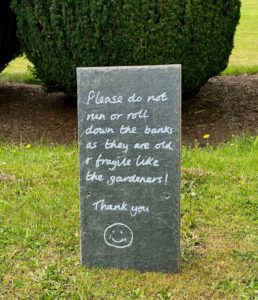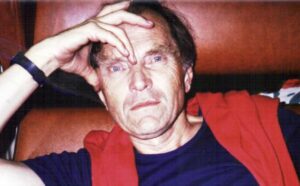A polite request in the grounds of Dartington Hall in Devon.
Quote of the Day
”When I find myself in the company of scientists, I feel like a shabby curate who has strayed by mistake into a drawing room full of dukes.”
- W.H. Auden
Nice, but it smacks a bit of what is now called “humblebragging” on social media.
Musical alternative to the morning’s radio news
Brian McGrath, Cathal Hayden & Steve Cooney | Banjo Duet | Gradam Ceoil TG4 | 2000
Note that it’s a ‘duet’, not a duel.
Long Read of the Day
How clothing and climate change kickstarted agriculture
An intriguing Aeon Essay by Ian Gilligan, a prehistorian at the University of Sydney and the author of Climate, Clothing, and Agriculture in Prehistory: Linking Evidence, Causes, and Effects.
(With thanks to Andrew Curry, who spotted it first and wrote a nice commentary on it.)
Remembering Paul Feyerabend
Chancing on this video was an example of the blissful serendipity offered by the Web. It’s an extended interview of the philosopher Paul Feyerabend on Italian TV. And it’s in English.
What was striking about it was the way it suddenly reminded me of a thinker who had streaked like a comet across the sky when I was a young academic. I have always been interested in the philosophy of science, and spent much of the 1970s oscillating between the views of Karl Popper and Thomas Kuhn and the attempts of Imré Lakatos to find some way of bridging the chasm between the two.
And then in 1975 came Feyerabend’s remarkable book, Against Method: Outline of an Anarchistic Theory of Knowledge, an intellectual grenade lobbed into those austere controversies.
It was one of those books which forever changes the way one thinks. Certainly it had that impact on me. And there have been interesting echoes of the issues it raised in current controversies about “following the science’ in the Covid crisis. When the book appeared in the 1970s it met with predictable responses from the philosophical establishment, which interpreted it as a frontal attack on ‘science’. What I hadn’t appreciated at the time was the personal toll that this hostile reaction took on Feyerabend. I knew very little about him as a person, and I assumed from his wonderfully insouciant style that he wouldn’t give a damn what these people thought.
But he did, and was deeply depressed for a time. Later on, he wrote movingly in his autobiography about it:
The depression stayed with me for over a year; it was like an animal, a well-defined, spatially localizable thing. I would wake up, open my eyes, listen—Is it here or isn’t? No sign of it. Perhaps it’s asleep. Perhaps it will leave me alone today. Carefully, very carefully, I get out of bed. All is quiet. I go to the kitchen, start breakfast. Not a sound. TV—Good Morning America—, David What’s-his-name, a guy I can’t stand. I eat and watch the guests. Slowly the food fills my stomach and gives me strength. Now a quick excursion to the bathroom, and out for my morning walk—and here she is, my faithful depression: “Did you think you could leave without me?”
He was, by all accounts, an unforgettable lecturer. The entry for him in the Stanford Encyclopedia of Philosophy quotes a memoir of one of his students which brilliantly conveys that.
Sussex University: the start of the Autumn Term, 1974. There was not a seat to be had in the biggest Arts lecture theatre on campus. Taut with anticipation, we waited expectantly and impatiently for the advertized event to begin. He was not on time—as usual. In fact rumour had it that he would not be appearing at all that illness (or was it just ennui? or perhaps a mistress?) had confined him to bed. But just as we began sadly to reconcile ourselves to the idea that there would be no performance that day at all, Paul Feyerabend burst through the door at the front of the packed hall. Rather pale, and supporting himself on a short metal crutch, he walked with a limp across to the blackboard. Removing his sweater he picked up the chalk and wrote down three questions one beneath the other: What’s so great about knowledge? What’s so great about science? What’s so great about truth? We were not going to be disappointed after all!
During the following weeks of that term, and for the rest of his year as a visiting lecturer, Feyerabend demolished virtually every traditional academic boundary. He held no idea and no person sacred. With unprecedented energy and enthusiasm he discussed anything from Aristotle to the Azande. How does science differ from witchcraft? Does it provide the only rational way of cognitively organizing our experience? What should we do if the pursuit of truth cripples our intellects and stunts our individuality? Suddenly epistemology became an exhilarating area of investigation.
Feyerabend created spaces in which people could breathe again. He demanded of philosophers that they be receptive to ideas from the most disparate and apparently far-flung domains, and insisted that only in this way could they understand the processes whereby knowledge grows. His listeners were enthralled, and he held his huge audiences until, too ill and too exhausted to continue, he simply began repeating himself. But not before he had brought the house down by writing “Aristotle” in three-foot high letters on the blackboard and then writing “Popper” in tiny, virtually illegible letters beneath it!
Feyerabend later in life. Photograph by Grazia Borrini-Feyerabend
Another thing I hadn’t known was that his health was very poor. He was in the Wehrmacht on the Eastern Front in the Second World War and while directing military traffic during the German retreat he was shot three times, with one bullet hitting his spine, leaving him with chronic pain and difficulty in walking. And, in a way, his iconoclastic attitude towards establishment worship of ‘science’ may have been at least partly influenced by personal experience. The Stanford enclopedia entry hints at that:
Because his health was poor, Feyerabend started seeing a healer who had been recommended to him. The treatment was successful, and thenceforth Feyerabend used to refer to his own case as an example of both the failures of orthodox medicine and the largely unexplored possibilities of “alternative” or traditional remedies.
This blog is also available as a daily email. If you think this might suit you better, why not subscribe? One email a day, Monday through Friday, delivered to your inbox at 7am UK time. It’s free, and there’s a one-click unsubscribe if you decide that your inbox is full enough already!


